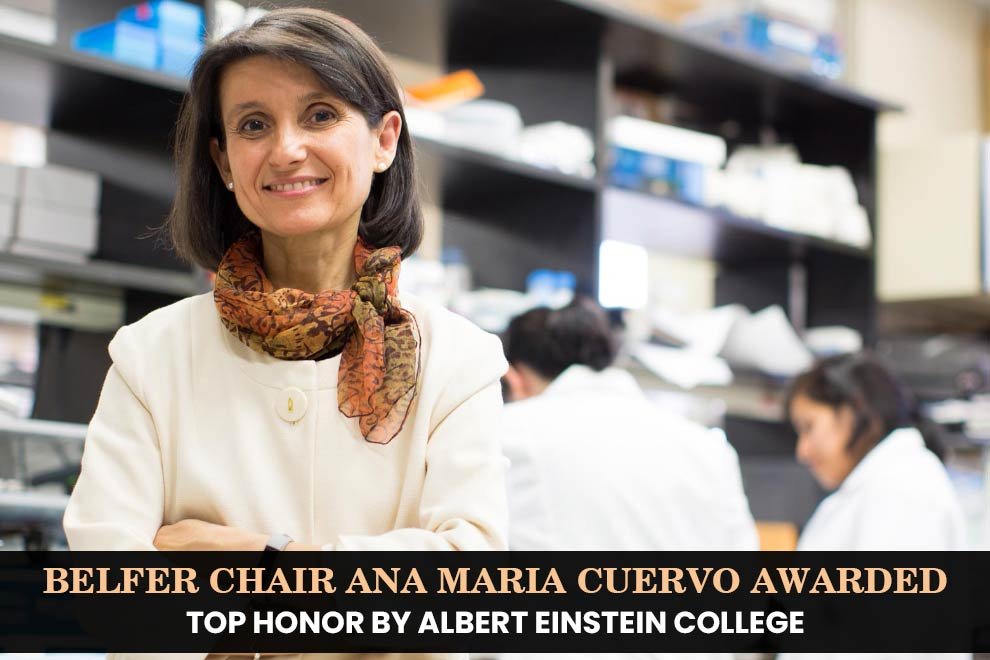Albert Einstein College of Medicine honored Ana Maria Cuervo, M.D., Ph.D. as a distinguished professor within its developmental and molecular biology department. This distinction is the highest form of recognition the institution offers for faculty achievement.
Cuervo, who has been part of the Albert Einstein College of Medicine community for over two decades, holds a tenured position in both the developmental and molecular biology and medicine departments. She occupies the Robert and Renée Belfer Chair for Neurodegenerative Disease Research, co-directs the Institute for Aging Research at Albert Einstein College of Medicine, and is actively involved with the Montefiore Einstein Comprehensive Cancer Center and the Marion Bessin Liver Research Center.
“Dr. Cuervo has served as an inspiring, deeply admired, and collaborative colleague, an exceptional researcher, and a beloved and successful mentor to a generation of students and postdocs,” stated Yaron Tomer, M.D., the Marilyn and Stanley M. Katz Dean at Einstein and Chief Academic Officer at Montefiore Medicine. “I know I speak for our leadership and the entire Einstein community in congratulating her for this well-deserved honor.”
The Robert and Renée Belfer Chair’s Career Milestones
The Robert and Renée Belfer Chair[1] for Neurodegenerative Disease Research at Albert Einstein College of Medicine is a prestigious faculty position endowed by the Belfer family to support research specifically focused on neurodegenerative diseases and other related conditions. Endowed chairs are significant in academia because they provide sustained funding and resources for scholars to pursue innovative research, teach, and contribute to their field’s body of knowledge.
Cuervo’s research focuses on autophagy[2] , a cellular process critical for removing and recycling cellular waste, damaged parts, old proteins, and other debris that can interfere with normal functions.
Cells need a way to clear out this waste to stay healthy and function properly. Autophagy is the process that addresses this. Through autophagy, the cell forms a bubble-like structure around waste materials. This bubble then carries the waste to a part of the cell that acts like a stomach, called the lysosome, where the waste is broken down into basic building blocks, such as amino acids.
The cell can then reuse these building blocks to make new, viable parts like proteins and membranes. Autophagy is a way for cells to clean up and recycle while keeping them healthy and efficient.
The Robert and Renée Belfer Chair for Neurodegenerative Disease Research is responsible for pioneering work that has shed light on chaperone-mediated autophagy, a selective rather than random process, and its implications for age-related diseases, including Type 2 diabetes, cancer, and neurodegenerative conditions such as Alzheimer’s and Parkinson’s. Cuervo’s efforts aim to enhance autophagy as a therapeutic strategy against these disease conditions.
With a prolific output of over 150 peer-reviewed articles, numerous reviews, two patents, and approximately 500 global presentations, Cuervo’s contributions have earned her widespread recognition, including membership in prestigious academies such as the Royal Academy of Sciences of Spain, the Royal Academy of Pharmacy of Spain, the National Academy of Sciences, and the American Academy of Arts and Sciences.
She played a pivotal role in establishing the Academy for Health & Lifespan Research and holds the title of International Academic at the Royal Academy of Medicine in Valencia, Spain. For 14 years, she was the co-editor in chief of the journal Aging Cell.
Cuervo’s leadership extends to significant roles in scientific organizations such as the Gordon Conference and Keystone Symposia. She has also contributed her expertise to several National Institutes of Health panels, including the National Institute on Aging Scientific Council, the NIH Council of Councils, and the Board of Scientific Counselors for the National Institute on Aging.
During her tenure at the Albert Einstein College of Medicine, Cuervo has been honored with the Saul R. Korey Award for translational medicine and science, and the Marshall S. Horwitz, M.D., Faculty Prize for research excellence. She also plays a crucial role in academic publishing, serving on the editorial boards of both Cell Metabolism and Molecular Cell and holding the position of associate editor at the Proceedings of the National Academy of Sciences.
Cuervo actively supports and mentors women in science and medicine. Many of the outstanding female scientists she’s guided have become faculty members at Einstein. She has promoted gender equality in science by participating in the Feinstein Institute’s Committee for Advancing Women in Science and Medicine, presenting the L’Oréal-UNESCO lecture for Women in Science, and establishing the Women in Autophagy network.
At Albert Einstein College of Medicine, Cuervo has guided 23 graduate students as their thesis adviser and contributed to the advisory committee, qualifying exams, or thesis defenses for many others. In addition, she has provided mentorship to 35 postdoctoral fellows, three clinical fellows, and two post-baccalaureate students, along with a wide range of students at various levels from high school to master’s degree programs. She has welcomed 28 visiting scientists into her lab for collaboration and research.










